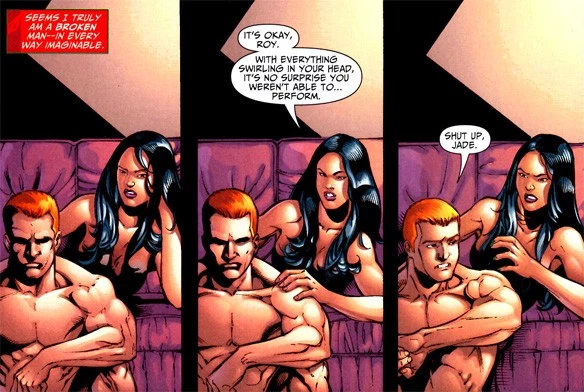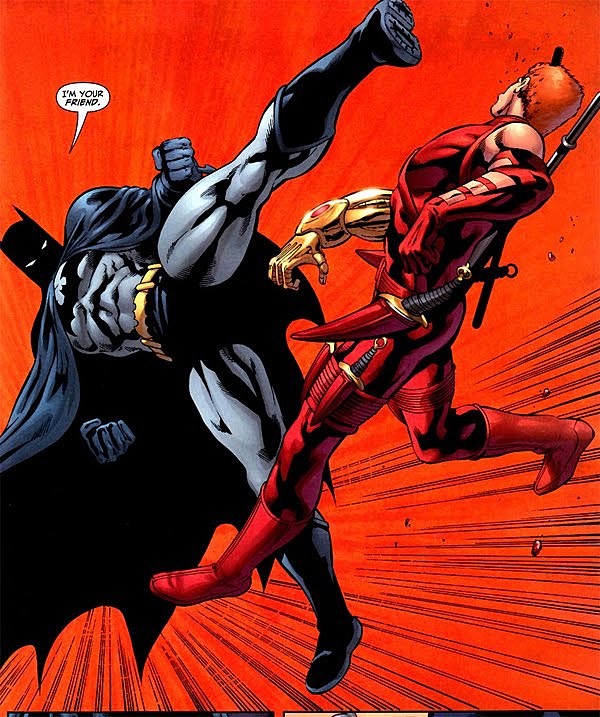
Worst of the Worst: ‘Justice League: The Rise of Arsenal #3′
 The thing about modern comics criticism is that the immediacy of the Internet makes it easier than ever to base reviews around a first impression. Believe me, I'm as guilty of it as anyone, but shades of grey tend to be replaced by snap judgments that play to the extremes, leading to titles quickly being deemed the best or worst comic ever printed on a weekly basis.
The thing about modern comics criticism is that the immediacy of the Internet makes it easier than ever to base reviews around a first impression. Believe me, I'm as guilty of it as anyone, but shades of grey tend to be replaced by snap judgments that play to the extremes, leading to titles quickly being deemed the best or worst comic ever printed on a weekly basis.
Judging from the online reaction I've seen, the current titleholder for Worst Comic Ever is "Justice League: The Rise of Arsenal" #3, and much like the book it dethroned to take that dubious honor -- "Justice League: Cry For Justice," of which "Rise of Arsenal" is a direct sequel -- it actually manages to live up to its reputation. It is thoroughly awful, the kind of book that people pass on to their friends for the same reasons they pop in "Manos: Hands of Fate" at a party.
It's essentially "The Room" for comics, but without the lighthearted fun: Truly atrocious, but so far gone that it moves back and forth between scenes that would be hilarious if they weren't meant to be serious (the title character beats a bunch of dudes half to death in order to protect the rotting corpse of a cat that he thinks is his dead daughter) and jaw-dropping out of sheer confusion about why someone would do this.
In short, it is not very good.Brian Hibbs had the first review I read of it, and while I'm not usually a fan of reviews that devote the majority of their space to recapping the actual events of the book, that's pretty much all you can do here. It's at the point where the majority of what's wrong with it is completely self-evident:
Roy Harper (the hero known at various times as Speedy, Arsenal, Red Arrow, and apparently Arsenal again) and Cheshire (an international terrorist and assassin who once destroyed an entire country) are fighting each other because their daughter died. Despite the fact that Cheshire's entire deal is that she has poisoned fingernails, she scratches Arsenal up and he's none the worse for wear.
During the fight, he thinks about how she was a great lay (almost as good as Hawkgirl!) and then offers up the immortal line "You're a skilled assassin, but as a mother -- you sucked!" Then he ties her up -- because "she likes it rough anyway" -- and, overcome with grief over his dead daughter, tries to have sex with her, but can't get an erection.
This is not subtext. This is what actually happens in the comic.

Denied the pleasure of sex with a grieving mother, Arsenal instead suits up to find "release" beating up crooks in a sloppy literalization of the super-hero as a power fantasy for the impotent, and then decides to do some heroin -- or "china cat," as he calls it, having picked up drug lingo from an episode of "Dragnet." After hunkering down in an alley to smoke up the China Cat (which is apparently an extremely powerful hallucinogen in the DC Universe), he hallucinates a gaggle of Promethei, fights them off to protect the aforementioned dead cat, and then gets in a scuffle with Batman, who kicks him in the face while saying "I'm your friend," which -- admittedly -- is a high point in the narrative.

He ends up being taken to a super-rehab clinic called Virgil House -- which, as CA contributor David Uzumeri pointed out, is a reference to Virgil, who guides Dante through hell in "The Divine Comedy," a reference so tired it's practically narcoleptic -- and ends the issue strapped to a table.
It's tempting to just leave it at that, because really, there's not much you can add to "Green Arrow's sidekick does heroin because he can't get a boner" that would make it sound worse than it already is. But there are problems in this story that run far deeper than what's on the surface.
The issue here isn't that Bad Things are happening to a character; that's just the nature of storytelling. Characters exist so that bad things can happen to them, and they need to have challenges and adversity to overcome to continue functioning. A character that nothing bad ever happens to is boring -- nobody wants to see Peter Parker get a steady job and have his girlfriend not thrown off a bridge, or Batman just drive around in a cool car with no crime to fight, or Scrooge McDuck just get richer and richer off the stock market. There needs to be conflict and opposition. That's not the problem.
The problem is that the things that are happening are just bad. They're poorly structured and executed, and twist characterization to fit a story that serves no real purpose.
Stop me if you've heard this one, but Cheshire appears in recent issues of "Secret Six," where she's very upset because one of her children has been kidnapped and likely murdered -- this time a child fathered by Catman, because apparently she's got a thing for red-haired dudes in costumes. It's virtually the same setup, but it plays out in a completely different fashion that involves her fighting the people responsible and showing genuine (if twisted) emotion over it.
In "Rise of Arsenal," however, her course of action as an assassin that once dropped nuclear weapons on the Middle East whose child was just murdered is to forget her defining abilities, meekly acquiesce to pity sex, and then reassure her lover that hey, this happens to a lot of guys whose arm-stumps have been infected with "nanomites."

Which leads to another problem: The things in this book that aren't terrible are things we've seen before. The idea of costumed super-heroics as a substitute and catalyst for sex that overcomes both sexual and social impotence is something that's been at the forefront of comics since "Watchmen," and while there's no shame in not being as good as "Watchmen," it's important to note that while it's about as subtle as a brick through the window, this was a revolutionary idea twenty-four years ago.
The difference is that Arsenal reverses it: Rather than the action leading to sex, he's a guy whose impotence leads him to go out and beat people up for no other reason than his own gratification. In a series ostensibly meant to make us care about this character after three years of shoehorning him into the Justice League, the creators have systematically stripped away any reason we have to be sympathetic towards him. There's no incentive to see his eventual (and inevitable) redemption.
 Even the heroin -- excuse me, China Cat -- addiction itself is building off something that happened over thirty years ago, although to my knowledge, the line about how he and a junkie pal double-teamed a "couple of real skanks" in Nashville is new. It's certainly possible to do a good super-hero story about the nature of addiction and relapse (Matt Fraction's work on "Iron Man" and his portrayal of Tony Stark's alcoholism being a continuing struggle to this day being a pretty stellar recent example), but this isn't it. The question, then, is why does this book exist? What storytelling purpose does Roy Harper stabbing cartoonish thugs while cradling a dead cat serve?
Even the heroin -- excuse me, China Cat -- addiction itself is building off something that happened over thirty years ago, although to my knowledge, the line about how he and a junkie pal double-teamed a "couple of real skanks" in Nashville is new. It's certainly possible to do a good super-hero story about the nature of addiction and relapse (Matt Fraction's work on "Iron Man" and his portrayal of Tony Stark's alcoholism being a continuing struggle to this day being a pretty stellar recent example), but this isn't it. The question, then, is why does this book exist? What storytelling purpose does Roy Harper stabbing cartoonish thugs while cradling a dead cat serve?
Considering that Arsenal is slated to join Deathstroke's Titans -- a team that was formed in a book where a woman killed someone by (no joke) burning him to death with her volcanic vagina -- I think it's safe to say that the entire point was to make him a (recovering) heroin addict named Arsenal who used a bunch of different weapons instead of a bow. Which is exactly what he already was five years ago. Even if he descends into villainy or "dies," it'll be just a pit stop before his eventual face turn, continuing the cycle of storytelling as ouroboros.
We already know where this comic is going, so the only thing it can possibly bring to the table is the story itself, and the story is abysmal, pawning off overblown vulgarity that would give even the worst fan-fiction a run for its money in the guise of maturity. Seriously, when you've got a character who literally ranks the women he has had sex with while whipping one of them with an electrical cord, the only thing you're succeeding at is lowering a comic with the words "Justice League" on the cover to the level of "Tarot: Witch of the Black Rose."
Or lower, actually. "Tarot" never had any height to fall from.

More From ComicsAlliance







![DC Universe: Batman Beyond Ongoing Announced, Rise of Arsenal ‘Extraordinarily’ Good [Fan Expo]](http://townsquare.media/site/622/files/2010/08/batmanbeyond-show.jpg?w=980&q=75)

